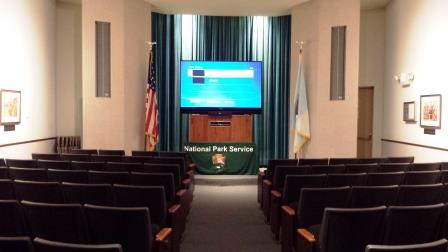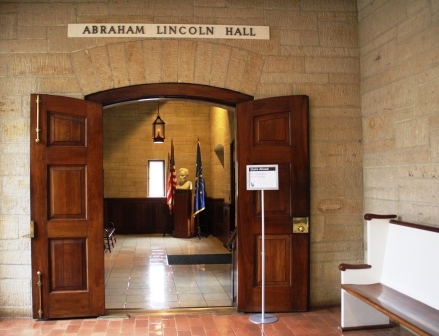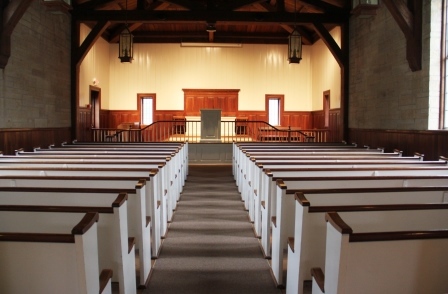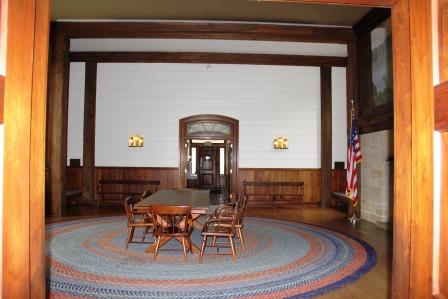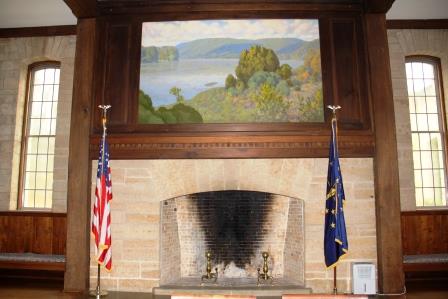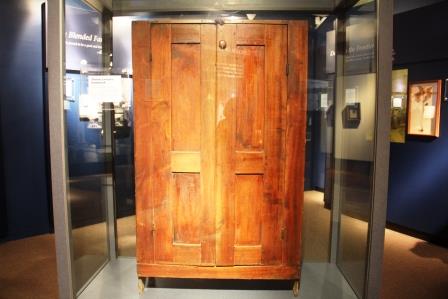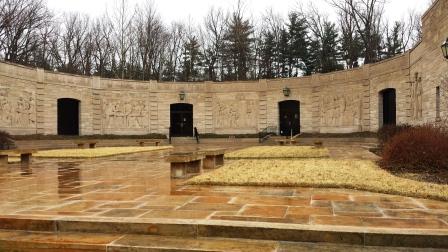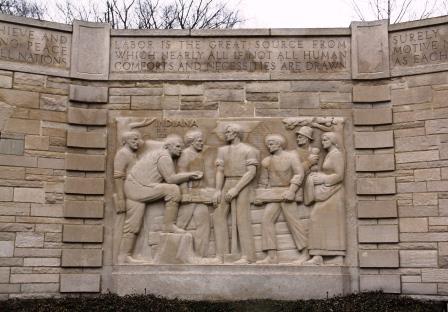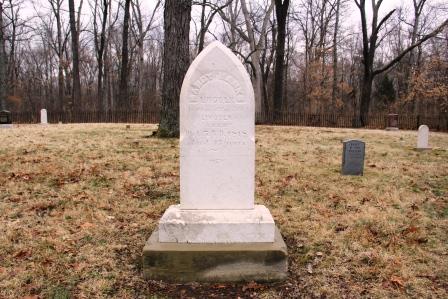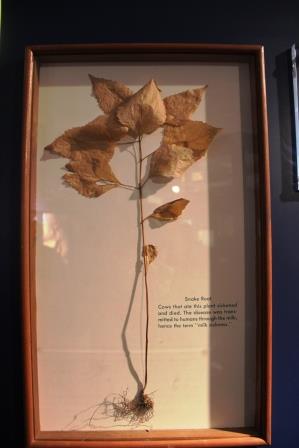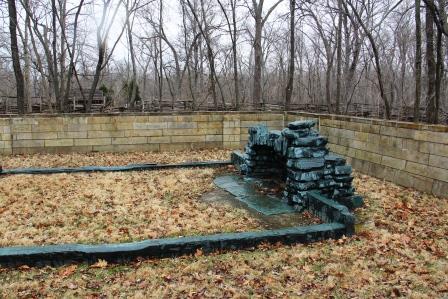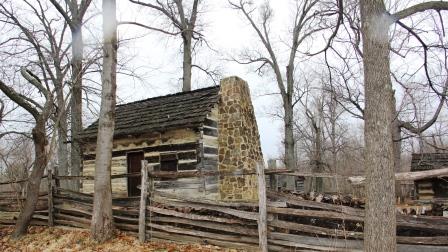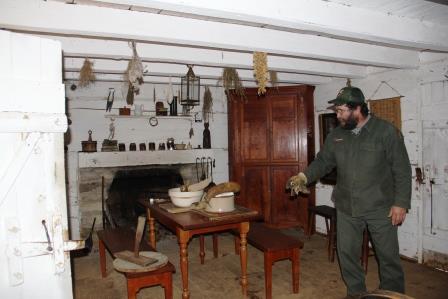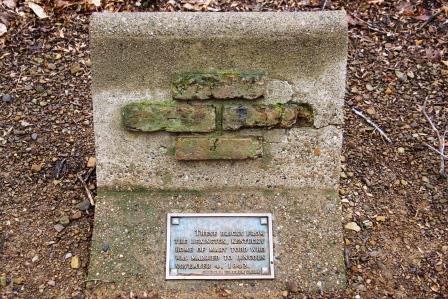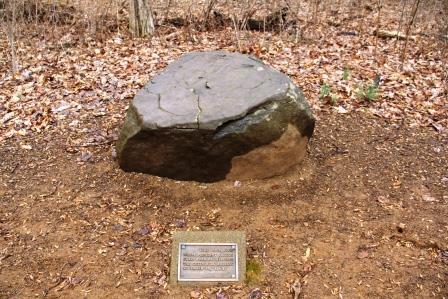In his 1859 autobiography, Abraham Lincoln referred to the farm where he lived with his family for fourteen years. He lived his formative years, from age 7 to 21, in the home where he lost his mother, where his step-mother continued to encourage his love for reading and learning, and where he was molded into the man who is often regarded as America’s greatest president. You can visit the very land where Lincoln grew up, in what is now Lincoln City, Indiana, at the Lincoln Boyhood National Memorial and Living Historical farm.
We reached our new home about the time the State came into the Union. It was a wild region, with many bears and other wild animals, still in the woods. There I grew up.” –A. Lincoln
Lincoln Boyhood National Memorial Visitor Center
Start with the orientation film in the theater for an overview of the Lincoln family’s move to Indiana following land disputes surrounding their Kentucky property and continuing through the years they lived there, until they moved to Illinois.
Peek into the Abraham Lincoln Hall, where pew-style seating similar to early courthouses and meeting houses is appropriate for weddings and church services sometimes held in the room.
At the opposite end of the visitor center the Nancy Hanks Lincoln Hall is decorated to resemble early Indiana.
A small museum that tells the story of Lincoln’s years in Indiana includes a cabinet said to have been built by Lincoln’s father, Thomas Lincoln.
Learn the history of the visitor center, including the artist who created the five stone carvings that flank the outside of the building, each featuring a scene depicting a significant period of Lincoln’s life.
National Park Service rangers are on hand in the visitor center to answer any questions you may have.
Lincoln Boyhood National Memorial Farm
As you walk to the farm, you’ll pass the small cemetery where Lincoln’s mother, Nancy Hanks Lincoln, is buried.
Lincoln’s mother died of milk sickness, caused by drinking the milk of cows that ate poisonous snake root, as she cared for ill neighbors who died of the same affliction. The cause wasn’t figured out until the early 20th century.
Walk the trail that the Lincolns cleared on the last part of their journey from Kentucky to reach their new homestead.
What is believed to be the exact site of the cabin is marked with a stone wall and bronze fireplace. Some of the original hearthstones, uncovered during a 1933 excavation, are on display in the visitor center.
A replica of the cabin and other farm buildings stand a short distance from the original site. This is a working farm during summer months, with work done as it was in Lincoln’s day. One exception is the garden. Back then, gardens would be planted in patches, wherever there was enough sunlight coming in through the trees. Today the garden is one large patch.
In season you may see the garden being plowed by a team of horses, wool or flax being spun into yarn, a blacksmith plying his trade, or a meal being cooked over an open fire. A few animals will be brought in, too, but not nearly as many as were here in Lincoln’s time. By the time the Lincoln family left Indiana, Thomas had grown the farm to 100 head of hogs.
Don’t miss a Midwest Wanderer post. For a FREE subscription, enter your e-mail address in the Subscribe2 box to the right and click Subscribe.
Trail of Twelve Stones
Twelve stones dot a one-mile wooded trail, each with a marker indicating its significance. Among them, see bricks from Mary Todd Lincoln’s Lexington, Kentucky, home and a rock from the site where Lincoln orated the Gettysburg address.
Plan on spending several hours at the Lincoln Boyhood National Memorial, particularly during the summer months when the Living Historical Farm comes to life.
The Lincoln Boyhood Home National Memorial and Living Historical Farm, run by the National Park Service, is located in southwestern Indiana, on Highway 162, Lincoln City. Check the web site for directions, hours and fees.
Disclosure: My visit to the Lincoln Boyhood Home National Memorial was hosted by the Spencer County Visitors Bureau, the Evansville Convention & Visitors Bureau, and the Lincoln Boyhood Home National Memorial, but any opinions expressed in this post are my own.
Thank you for reading Midwest Wanderer. If you enjoyed this post and would like an e-mail notification when other posts are published, enter your e-mail address below and click Subscribe. Be sure to click the link when you get the e-mail asking you to confirm.

